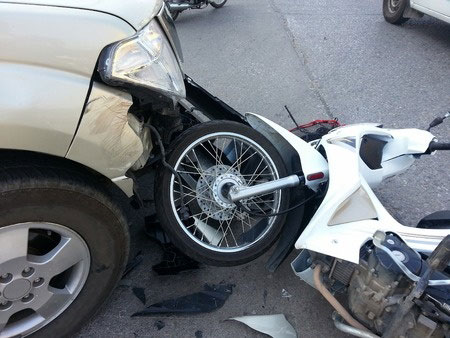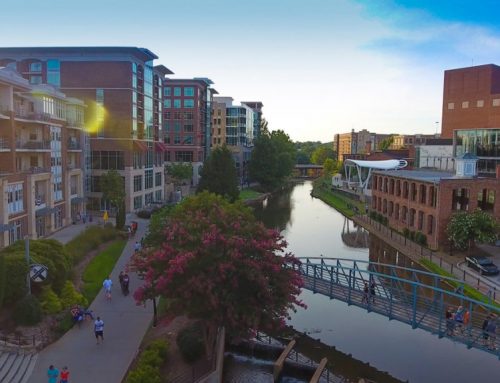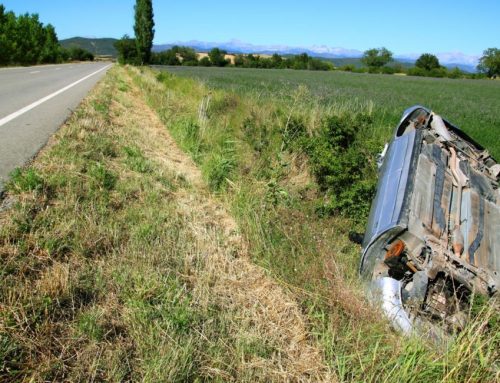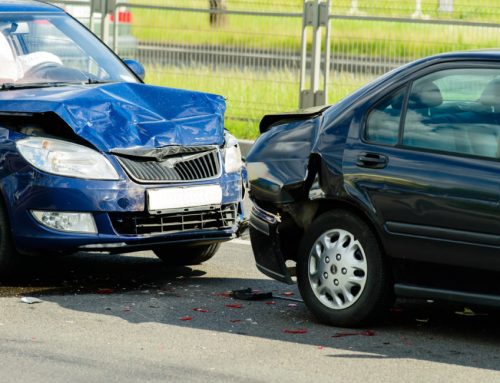John Maher: Hi. I’m John Maher. Today I’m speaking with Russell Guest and Richard Allen of Guest & Brady in Greenville, South Carolina. Guest & Brady is a personal injury law firm, and today we’re going to be talking about what to do if you’re in a motorcycle accident, and whether you need a motorcycle accident lawyer. Russell and Richard, welcome.
Russell Guest: John, this is Russell. Thank you for having us today.
John: Sure.
Richard Allen: John, this is Richard. Good morning.
John: Good morning.
Richard: Glad to be here.
Helmet Laws in South Carolina
John: Gentlemen, one unique feature of motorcycle law in South Carolina is that helmets are optional for adults. Can you tell us how much helmets matter if you’re in a motorcycle accident?
Richard: John, this is Richard. First, just to clarify what is required in South Carolina as far as the helmet [goes] is a person who is under the age of 21 is actually required to wear a helmet while either driving a motorcycle or riding as a passenger on a motorcycle.
There are certain requirements as far as our specifications as to the helmets themselves. The statute requires specifically a neck and a chin strap and some reflectorized components. However, the DOT actually sets the additional specs and standards for those.
Also, a person under the age of 21 is required to wear goggles and face shields as well. Those are the specs are set by the South Carolina DOT, Department Of Transportation. I don’t think we’ll go into those specific details.
As far as what the best practice is, that’s open to interpretation because we’ve actually talked to clients that would argue that a helmet can actually be unsafe. The reasons that they give for not wanting to wear a helmet is that it might impair or impede your peripheral vision, as well as impairing your hearing. They feel like they might be more aware of their surroundings. By not having a helmet on they might be able to respond to a potential accident and/or other situation.
John: Maybe they’re on the highway and a truck or another car is trying to pass them. If they have blinders on, like you said, because they have the helmet on, they might not be able to see that there’s a car coming up behind them or a truck that might potentially cause an accident in that way.
Richard: There is that belief out there.
John: Russell, anything to add in terms of how much helmets matter when you’re in an accident?
Russell: Just to add a little to the discussion about people under the age of 21 is that at all times, regardless whether they’re the actual driver or the passenger, [they are required to wear a] helmet.
The other addition in regards to the helmet is that you can wear a modified helmet that is DOT in South Carolina approved. It’s called a hat helmet. You’ve seen those that people wear perhaps on the roadway, it just covers the top of your head above your ear.
That would help to eliminate some of the concerns that Richard was talking about and certainly would be safer than not wearing anything at all. It’s not nearly as protective of course, in terms of the trauma that you might experience to the head or the face if you had a more protective covering helmet, but it is DOT approved, and it does allow you to have greater peripheral vision and also be able to hear at the same time.
There’s very few states that don’t require the use of a helmet, [and] almost all motorcycle riders understand this. We’re in South Carolina, bounded on either side by North Carolina and Georgia and Tennessee. Each of these states requires the use of a helmet, so if you’re out for a ride, typically, you have a helmet with you.
People understand that and they’re going to immediately put it on. If they’re not using it and wearing it within South Carolina roads, then they certainly are putting it on as soon as they get into those bordering states.
Motorcycle Accident Laws
John: Are other unique features of the law that motorcycle drivers should be aware of in the event of an accident?
Russell: Yes. One thing about it is there are different circumstances that can happen in a motorcycle accident that are common also to a motor vehicle accident, like an automobile.
One instance can be because oftentimes drivers of the “at fault” vehicle will say that they did not see the actual motorcycle. To make yourself as present as you possibly can, it’s great to run with your light on, it’s great to have reflectors on, anything you can do to increase your visibility would be important, because that’s a common refrain, “Sorry, we just didn’t see you.”
Having said that, there’s also times when people don’t even collide. There’s not a collision. The bike lays down in order to prevent the actual collision or it’s swerving out of the roadway in order to prevent the collision, and the car didn’t see them and just continues. It’s a situation that can occur and does occur.
In that instance, someone might suspect, “What is the coverage in that instance? Certainly, the car caused me to either lay my bike down and caused me to get injured or to go off the roadway, but they didn’t stop. They just left.” It could be that they were just not aware or they could have just fled the scene, either one.
In those instances, we would call those a “John Doe” situation. That’s common also, a same statute applies in a similar situation when this happens in a motor vehicle accident as well. When somebody leaves the scene, then he becomes an uninsured driver, and we then have to look to the uninsured coverages on the motorcycle in order to recover for damages to the property and also damages or injuries to the individual.
There are certain circumstances that have to happen in those instances. If you find yourself in that [situation], you have to reasonably report the accident to a law enforcement official in a reasonable time. That’s just dependent upon the circumstances, the degree of injury, when you can actually make the report.
We can argue what is reasonable, but certainly that report has to be made, that’s part of the requirements. Then, if there is an actual collision with a vehicle and the “at fault” driver has left the scene, that’s helpful to show that there was actual damage to your vehicle caused by another car.
If there’s no actual contact, you have to have a witness, other than yourself, to write an affidavit that says that [a] particular person [caused] you as a driver [to be] forced off the roadway or you were forced to lay your bike down and the other car fled the scene or left for unknown reasons. You have to have that other person.
That could be a passenger on your bike. It could be also a bystander or somebody who is there at the scene. Oftentimes you don’t have that, but that’s a necessity in order to bring the “John Doe claim.”
John: Is that just because they want to try to avoid motorcycle drivers who maybe make some sort of error and lay the bike down on their own, and then claim that it was another driver that drove them off the road or something like that.
Richard: It’s certainly to prevent insurance fraud, which might lend itself in a situation like that which you described. Comparative negligence always exists in our state. Even if you’re making an uninsured claim dependent on the facts, your own insurance company may argue against you even being partially at fault because of the circumstances.
That can always reduce some of the liability of the recovery that you might have if they’re successful in making that argument. You want to be able, as best you can, [to] secure all witnesses around you in order to help make that claim successful and get full recovery.
Uninsured Motorist Laws
John: You said for all intents and purposes, a driver who has left the scene, in the case where maybe they didn’t even know that they drove a motorcycle off the road, is considered an uninsured driver. Is that the same as if there was an accident and you knew who the person was that was responsible but they didn’t have insurance? Does it work the same way?
Richard: It does work the same way in terms of going after the uninsured coverage on your bike. However, what you have to prove is different. If the person is there and they’re admitting that it was their fault, for instance, or it’s easy to determine that it was their fault, then, there’s no requirement for the affidavit that I was describing earlier. You don’t have to have the witness.
In the John Doe situation where you don’t know the driver, there are other circumstances you have to do in order to get the coverage.
When to Contact a Motorcycle Accident Lawyer
John: When should you call a lawyer if you’re in a motorcycle accident and how can a lawyer help if you’re in a motorcycle accident?
Richard: I think in most cases it’s important to contact a lawyer [after] a motorcycle accident, and there are many reasons why. Russell touched on several of them earlier. To the extent that your injuries permit, you should certainly do what you are able to do as far as identifying witnesses at the scene, if you are able, perhaps taking pictures and preserving evidence.
However, oftentimes you’re faced with severe injuries. That’s another very important reason to have an attorney involved, so you can focus on your recovery and getting treatment and allowing the officer to take that burden off and allow you and your family to heal, as far as dealing with the liability insurance, all the various types of the insurance, medical providers, and medical liens. Russell, is there anything you’d like to add?
Russell: Yes. The injuries often are much more severe in a motorcycle accident. Simply, as we can imagine, there’s no protective cage around you. The broken bones and injuries to the head are very common in these types of accidents.
Those can cause complicating issues. They can cause extended periods of recovery, loss of work, and loss of wages. People often need help during the interim to be able to survive. Like most people, we need our income, if we’re working, in order to continue to meet our monthly bills and so forth.
It’s very difficult for an individual who’s not working with an attorney to be able to manage these circumstances. The biggest thing that we often hear from the clients is that just a simple relief of stress. Not having to deal with the insurance issues, not having to deal with the sometimes difficult insurance adjusters who are just simply trying to save their insurance company money and perform their job, and their job is not necessarily your best interest.
If you are concerned about those things and don’t want to deal with that and want to focus on your recovery, you definitely need to hire an attorney.
John: That’s really great information. Russell Guest and Richard Allen, thanks very much for speaking with me today.
Richard: Thanks for having us, John.
Russell: Thank you.
John: For more information about Guest & Brady visit their website at guestbrady.com or call 800‑903‑8101 or 864‑233‑7200.






